How to Create an Online Booking App
 24 January 2023
24 January 2023Have you identified a gap in the market where it makes sense to build an online booking solution? Perhaps, your city lacks a website that can help travelers to schedule guided tours. Well, this was a startup idea by one of our customers, which saw us creating Georgia4travel, a tourist portal for the Georgian market.
Creating a booking app is applicable for many other use cases aside from travel. It can work for any service that people can book online, for instance:
- Transportation: Taxi hailing, flight booking, public transport, car hire
- Hospitality: Accommodation, food & drinks, catering
- Mobile businesses: Detailing, cleaning, repairs, maintenance, plumbing
- Health care: Doctors’ appointments or therapy sessions.
Today’s article elaborates on how to create a booking app focusing on the travel and transportation sector, as it represents the most-active segment in the niche.
Learn about the step-by-step process of how to make a service booking app with a development partner. See what goes into the development process including costs and tech stack.
Become familiar with APIs solutions that introduce complex functionalities in the app without building things from scratch.
Online booking app market: Reasons to Invest
As you figure out how to make a booking app, it’s essential to have a strong reason to justify the time and capital investment. The following reasons reveal why it may be a good investment to think about developing an online booking app:
1. Popularity and huge demand
Booking applications have increasingly become more popular and integral in the daily lives of users.
The accelerated adoption of online solutions was necessitated by the COVID-19 pandemic but also by the digital transformation taking place all over the globe.
Changing consumer preferences have also played a role, with people seeking faster, personalized, and more convenient purchase experiences.
There are plenty of stats that show the key role of online booking applications:
- In 2021, the online travel industry generated revenues of more than $800 billion. And it’s estimated to post a massive growth of about 10.58% CAGR between 2021 to 2027 when revenues could exceed $1463 billion (Research and markets).
- 83% of US residents prefer to reserve their trips online (Condorferries).
- In 2018, 82% of all online travel bookings took place without human interaction (Stratojets).
- Over 90% of people carry out their holiday research online and a whopping 80% complete their bookings on the web (Condorferries).
2. Availability of unexploited niches
The online booking industry covers a wide range of segments and services. Despite the dominance of top online booking sites such as Expedia.com, Booking.com, or Hotels.com, startups can still identify an underserved niche that they can occupy.
Some strategies you can use to find a niche include
- Assessing real-world problems that you encounter in your profession or business;
- Considering your interests and passions;
- Performing competitor analysis to find audiences that competitors are undeserving;
- Performing keyword research and looking for emerging trends;
- Looking out for exciting problems that require big solutions;
- Capitalizing on your greatest strengths and unique selling points.
For instance, after successfully creating Georgia4travel, our startup client identified that people were looking for transfer services to places that were not exactly tourist hotspots. This led to the creation of another online booking service, Localtripfinder where individuals could customize their own routes while getting help selecting the appropriate transport and leisure activities along the way.
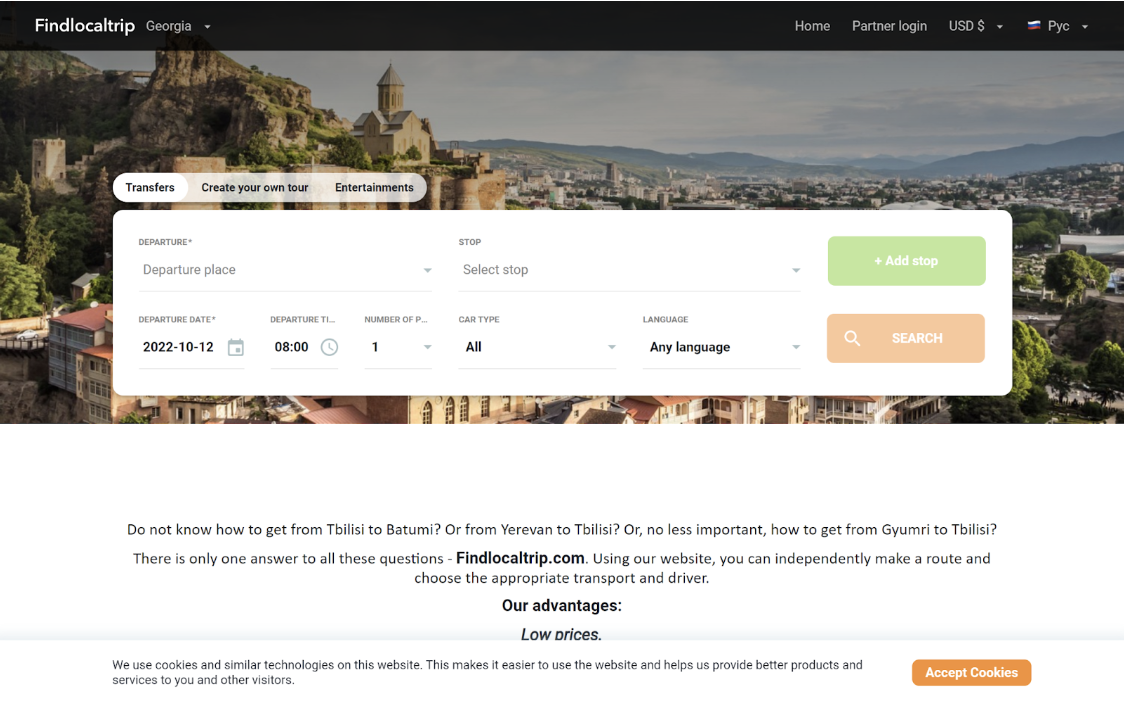
3. Flexible business models
The online booking industry offers a lot of flexibility in terms of the business model that startups and businesses can apply.
- Online travel agencies (OTAs): It’s an online marketplace where users can research and book travel products and services. OTAs act as middlemen by maintaining direct relationships with vendors and consumers. Under a merchant model, customers pay for services to the OTA, which remits the payment to the vendor. With a commission-based model, the vendors pay a commission for successful bookings.
- Metasearch/aggregator engines: The website acts as an aggregator of deals from OTAs and other sources. It is one of the simplest models to implement as the application only needs to integrate APIs from other booking sites instead of entering into contracts with vendors.
- Brand: This is the appropriate model if you’re figuring out how to create an online booking system for your app. The app will serve the needs of your users. For instance, if you run a cleaning service, it will help users to book and schedule their appointments. The brand app will have several benefits: Boosting income, streamlining communications, building loyalty, and enhancing marketing objectives.
Many potential monetization strategies
There are plenty of ways that may be used to monetize scheduling software in any niche. Some of the top ways include:
- Advertising: Users download the app for free but it offers advertisers various ad placement options (banner ads, native ads, interstitial ads, rewards ads, etc).
- In-app purchases: The booking app can offer extra content, features, or subscriptions that users can buy in the app, for instance, membership to see exclusive cheap flights before other users. Though this is not a common business strategy utilized by top booking apps.
- Cost per click or CPA: The model is typically utilized by meta-search engines and aggregators where they earn money for the total number of clicks generated or successful acquisitions. It’s akin to affiliate marketing.
- Direct monetization: Users purchase your services or products directly from the app or website, for instance, by selling rooms on a hotel reservation system.
- Merchant model: You partner with vendors to secure a net rate on rooms, flights, rentals, etc, before adding your markup. Your site can process all incoming payments, and pay the vendors after.
Commissions-based model: Vendors pay a commission based on a predetermined rate for every successful booking your site generates.
Types of booking apps
Part of figuring out how to create an online booking system is determining the type of booking app you want to build.
There are two distinct categories when assessing types of booking apps. The basic working principle will remain the same: the application presents a series of options. Users review and choose the most appropriate service. They either pay on the checkout page or in person when they obtain the service.
The main differentiator is the duration it takes to deliver the service.
1) On-demand service booking
The timeline between order confirmation and delivery is quite short. Clients may receive the services within the same day. Typical examples include
- Carpools, taxis, and on-demand ride-hailing services;
- Pickup and delivery services for groceries, medication, or food;
- Home services such as cleaning, repair, maintenance, building, and other tasks.
2) Scheduled-service booking app
The main distinction is that the timeline between order confirmation and service delivery is longer with durations of up to several weeks or months. Some typical examples include:
- Hotel booking (Trivago, Kayak, Airbnb)
- Car rental (Autorentals.com, Priceline, Hotwire)
- Flight booking (Momondo, Expedia, Skyscanner)
- Events and concert booking (Ticketmaster, Livenation, Seetickets)
- Tours and things to do (TourRadar, Viator, Booking Tours, Travelocity.com)
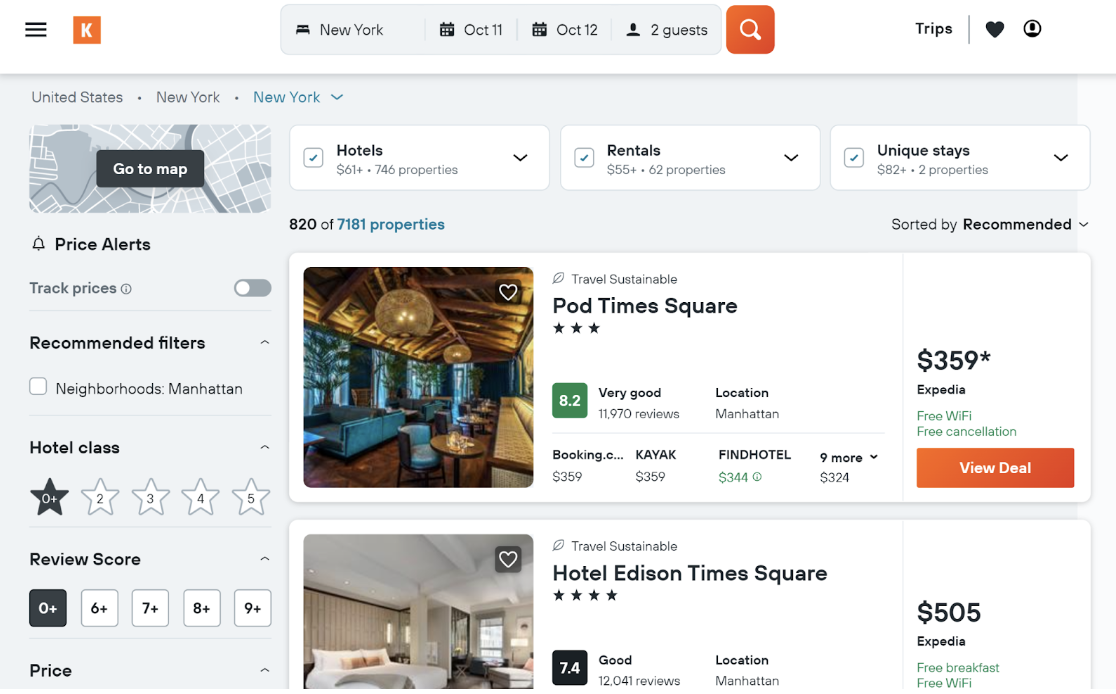
How to Create an Online Booking System?
There’s a wide range of opportunities when figuring out how to create a booking system. It’s essential to choose the right segment that plays towards your strengths & interests and one with a unique niche and potential for growth.
You should follow a systematic approach that ensures that you have not overlooked everything. We recommend the step-by-step approach when creating a booking website for any niche.
1. Market and competitor research
Every business solely exists for the purpose of serving its customers. For a strong starting point, it’s essential to identify who is going to use your booking system.
What are their needs and pain points? You can even go as far as coming up with buyer personas to gain an intricate understanding of potential consumers. It’s also quite useful to engage with users and
collect their thoughts about their needs, using surveys, in-person interviews, live calls, etc.
When entering a new market, it’s essential to research existing entities, serving your target users either directly or indirectly. For instance, if you’re developing a hotel booking website, direct competitors may comprise local travel agencies and other booking apps.
Competitor research can reveal the top features of the MVP. It can improve your USP by focusing on untapped opportunities stemming from user dissatisfaction with current solutions.
2. Find developers
If you don’t have the technical know-how to create an online booking system, you will require professional help.
Hiring developers can become intricate and confusing. Ideally, start with a budget of how much you’re willing to pay. This determines the development partner (freelancer or agency) and their location.
Since the idea is still untested; the minimal viable product (MVP) needs to take the least time and budget to build.
While hiring freelancers seems like a viable way to save on costs, the team needs multiple expertise. Freelancers carry an extra risk as they may abandon the project halfway for a better-paying gig. They may get sick or disinterested.
An app development company offers more experts in team composition and reduced development risk. And here are some places to find one:
- Clutch – Outsourcing companies all over the world;
- Dribbble and Behance – Find developers based on their work;
- Themanifest.com – Ranks the top outsourcing companies;
- Goodfirms.co – Lists company profiles and verified reviews.
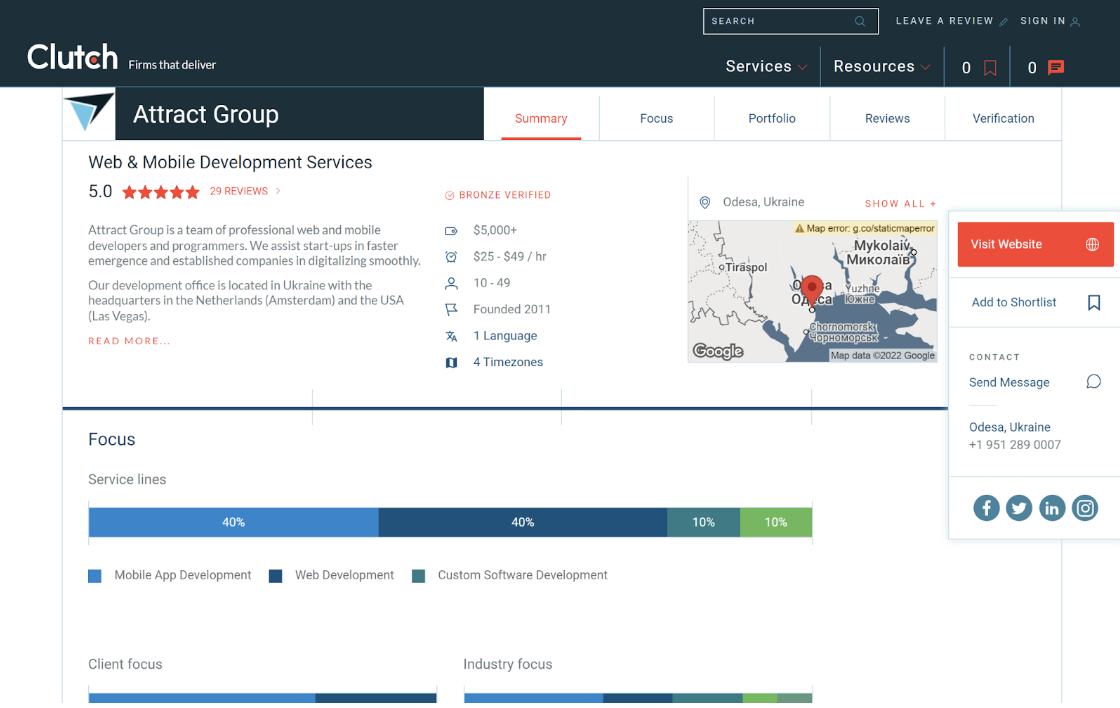
*Outsourcing to off-shore development centers like Eastern Europe can translate into savings. For instance, based in Ukraine, Attract Group has proven its worth in the app development niche. We’ve worked on two related online booking systems.
3. Prototypes and design
The first phase of the development process entails developing the design and interface. This takes place through several cumulative stages including sketching, user stories, wireframing, and developing prototypes.
Creating a low-fidelity prototype with limited interactivity is advised, before progressing to the UI/UX design and creating the high-fidelity prototype.
4. Build an MVP
The MVP is the first version of the online booking app you intend to create. It contains the bare minimum features required to test and
validate the idea on the basis of finding out if there is a real demand for the solution.
How are the core features selected to create a booking app? Based on our approach, we determine must-have MVP features based on market analysis, client requirements, main pain points, unique selling points, and competitor research.
Some features for an online booking app focusing on travel bookings like Georgia4travel include:
- Admin panel – Critical for employees to create new listings for tours;
- Online booking module: The module facilitates online booking, providing tourists with information about schedules, availability, and tours;
- Advertising widgets – The widget encourages third-party partners to promote the Georgia4travel on their social media pages and earn from referrals;
- Ratings and feedback – Social proof is a critical component of any booking website, so we provided users with a way to rate and review their tours.
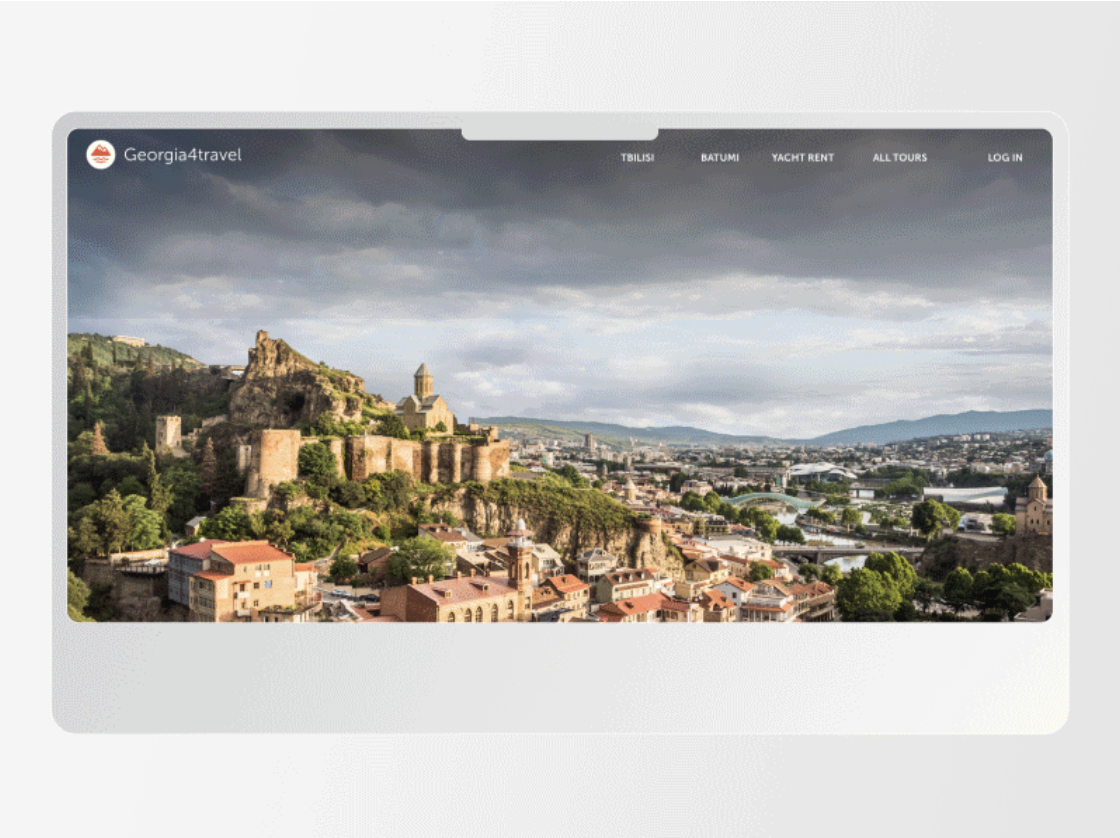
5. Release and improving
The release of the MVP is just the beginning. It’s the starting point of validated learning to determine if the app connects with users and solves their problems. Measurement is integral for learning. That’s why it is necessary to collect and analyze user engagement metrics.
After knowing what users want or areas for improvement, you implement new changes and introduce new features.
Tech Stack for Online Booking App Development
As you figure out how to make an online booking system, it’s key to know the required tech stack.
Basic tech stack for app development
To figure out the right tech stack for the online booking system, it is essential to begin by defining the goal (product scope) of the application. Other factors to consider include the time to market, target platforms, cost, and expected performance. Here are some recommended technologies used for developing custom booking applications:
- For native development – Swift for Android and Kotlin for native iOS apps
- For cross-platform development – Flutter is highly recommended as it promotes code reusability on macOS, Windows, Android, and iOS.
- For the backend – The following solutions may be utilized: php, python, Django, RESTl api, Celery, WebRTC, PostgreSQL, etc.
- For web applications – Laravel framework, jQuery,
- For database management – MySQL, PHP,
- Third-party integrations – Google Analytics, YooMoney.
Online booking APIs
APIs open a world of possibilities when creating a booking app. The development team can avoid writing a lot of code to implement features — this can lead to fewer potential mistakes, reduce the time to market, and save on the costs of creating an app. Developers select APIs based on the features or data required for integration.
If you’re wondering how to create a booking application, here are some potential APIs that may be quite useful.
1. Flight booking APIs
Many online travel agencies and metasearch engines such as Trivago utilize flight booking APIs to collect data about flight prices. It’s preferable to have a single API integration that can allow users to search, book, and confirm their flights. Some top flight booking APIs include:
- Skyscanner Travel APIs – Developers can build innovative apps that offer the best flight deals to customers. It offers access to 1300 supply partners in over 50 markets.
- FlightStats Flex APIs – It provides real-time flight and airport information across the travel ecosystem. The data comprises flight status, weather, ratings, flight position, and more.
Additional APIs include British Airways NDC, Expedia API, Flight API, and Amadeus Flight Search API.
2. Car rental APIs
Rental car APIs stand at the core of the reservation network by storing and retrieving data from car rental suppliers in various regions. The APIs help complement the deals on online travel booking websites. Popular examples include:
Sabre Car Locations API – The API can allow users to search for vehicles in various locations, and returns data about rates and availability. It partners with over 40 large car rental companies.
- Skyscanner Car Hire Live Prices API – Integrating the API can allow users to find and compare the best deals from major providers, including Avis, Hertz, and Sixt.
Other popular car rental APIs include TraveloPro’s Global Car API, Trawex Universal Car API, eTravos Car Rental API, and Amadeus Car Rental API.
3. Hotel Booking APIs
The APIs are typically provided by online travel agencies that maintain direct relationships and contracts with hotels or vacation rentals. Popular examples include:
- Expedia EPS Rapid API – The API can facilitate end-to-end hotel bookings, and it’s widely used by other travel agencies, metasearch engines, leading airlines, and even royalty and membership programs.
- Booking.com Connectivity APIs – It’s targeted at property owners and allows them to send and retrieve data on properties listed on bookings.com.
- Google Hotel Prices API – The API is utilized for sending hotel prices and hotel information to Google. It allows vacation rentals to create payment pages and reservation systems.
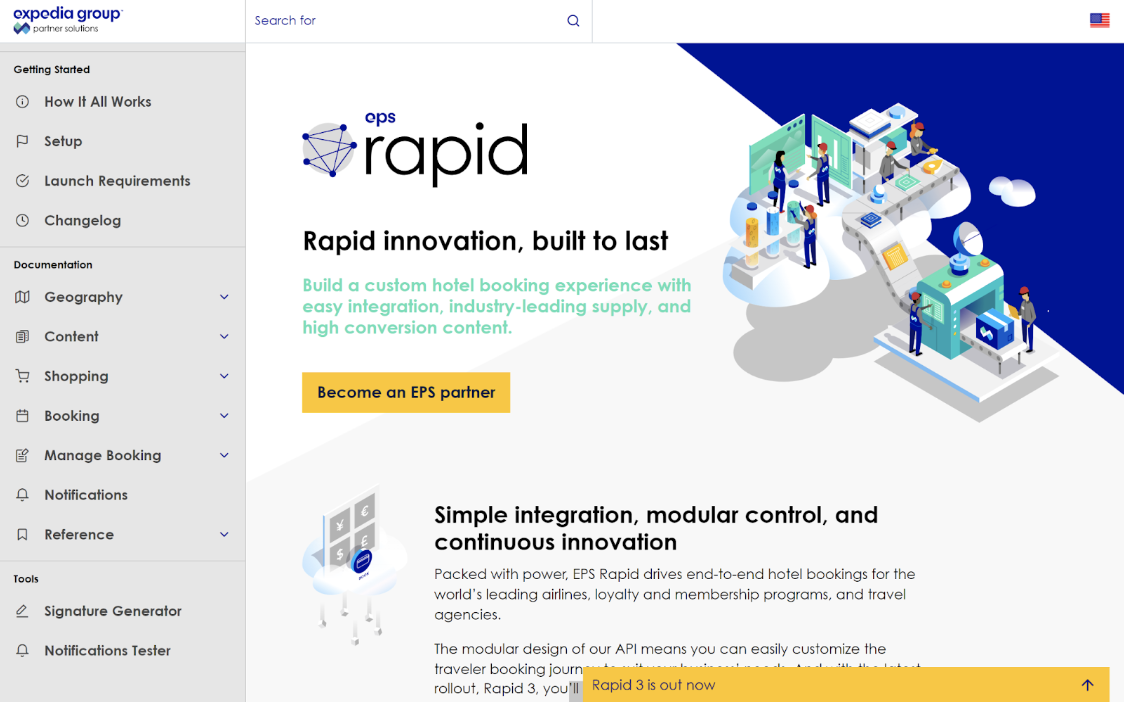
Other similar APIs include TripAdvisor Content API, MakCorps Hotel Price Comparison API, Amadeus Hotel search API, Scanners Hotels API, and Trivago Fastconnect.
Cost to make an online booking app
So, how much does it cost to make a booking app? Well, the cost is influenced by many factors, including:
- Number of target platforms: You can cut costs with a Flutter development service, rather than developing separate apps for iOS and Android.
- Design complexity: Complex apps generally have more screens and utilize custom elements.
- Number of features: Many features increase the coding and testing time.
Team composition: The team can comprise the Project manager, UI/UX Designer, iOS developer, Android (or Flutter developers), Backend developer, QA, or DevOps.
How is the estimate carried out:
Ultimately, the cost to create a booking system is determined by the total development time multiplied by the hourly rates. From our experience working on Localtripfinder and Georgia4travel, the minimum cost of developing such an app is between $30-50k for a cross-platform app built with Flutter. You should consider all the factors that are included in the development of the service to understand the cost to make a hotel booking website.
How long will it take?
According to our experience, it takes anywhere from 3 months to 6 months to develop a web version, depending on the complexity of the functionality and design of the application.
Conclusion
This article has discussed how to make an online booking system by sharing a five-step process that starts with market research and ends with launching and improving. It’s critical to develop the appointment booking app quickly and with sparse resources when testing the idea. Finding excellent MVP Development Services is critical and may impact your future survivability and competitiveness.
We offer our excellent services at an affordable development cost. You’ll work with a professional English-speaking team with many years of development experience. We already have a competitive advantage, having developed various applications with booking features. As a starting point for further collaboration we can discuss your app ideas. After that you can rest assured that we’ll provide you with the best results.









